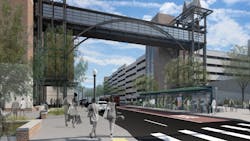PRT signs $99.8 million construction contract for Phase II of University Line
The Pittsburgh Regional Transit (PRT) Board has approved a $99.8 million construction contract for the second phase of the University Line. The second phase spans about three miles from the edge of Uptown to Oakland along Fifth and Forbes avenues.
“We’re extremely excited for Phase II to begin and for the entire project to get going,” said PRT CEO Katharine Kelleman. “The University Line will not only bring more transit, bicycle and pedestrian amenities and safety but will also serve to improve and revitalize the neighbors in which it operates.”
Phase two includes 18 new transit stations located along six miles of dedicated bus-only lanes, two miles of protected bike lanes and a host of amenities including new sidewalks, street trees and lighting and curbs with accessible ramps. Station amenities include fare vending machines, emergency phones, seating, lighting, real-time bus arrival signs and security cameras.
Thirty-nine intersections throughout the corridor will be modernized to include safety and accessibility improvements such as ADA-compliant curb ramps and crosswalks, new traffic signals and accessible pedestrian signals with push-button activators and illuminated pedestrian countdown signals. Eventually, buses will have traffic signal priority throughout most of the corridor.
To support service, PRT will add 69 new buses to the fleet by the end of the year. Fifty-four will be 60-foot clean diesel articulated buses and 15 will be 60-foot battery-electric articulated buses. PRT will host meetings with the community and stakeholders before phase two construction begins in spring 2025. Phase two construction is estimated to take 24 to 30 months to complete.
PRT's board awarded Independence Excavating a $27.9 million contract in March 2023 for phase one in downtown Pittsburgh. Construction began in September 2023 and includes five stations on Fifth and Sixth avenues. The first phase is expected to be completed in Spring 2025. PRT has budgeted $291 million for the total project, more than half of which is federally funded.
